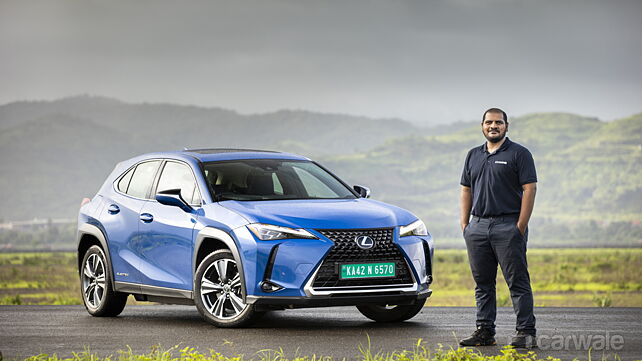Why would I buy it?
- Reliable electric drivetrain
- Attractive styling with compact dimensions
- Feature loaded
Why would avoid it?
- Second-row space and quality are not up to the mark
- Dated cabin
- Not exciting to drive
What is it?
Lexus as a brand has always been associated with luxury, comfort, and exclusivity. Currently, Lexus offers the NX, RX, and LX SUVs, ES and LS sedans, and the halo LC coupe in our country. But the Japanese carmaker is now weighing in to bring an entry-level offering for India – the UX.

The UX is a new nameplate for Lexus – first introduced in 2019 – and is available in hybrid and pure electric versions. Now, this one is the smallest crossover in Lexus’ SUV line-up. It is so small that Lexus categorises it into hatchback for some markets. Let us take a closer look at the all-new UX300 and consider the reasons why you should buy it if ever Lexus decides to launch it in the country.

Is the cabin any good?

Despite it being a crossover, stepping into the UX is like getting inside a low-slung sports car. It's low and you’d have to bend in to enter. Once inside, you are welcomed by a typical Lexus-style cabin. It’s not very fancy, but neither is it boring to look at. You can call it quirky though. And the quality of the materials here is top-notch still.

There’s a combination of blue and black on the sculpted dashboard which carves in, juts out, and flows in a very eccentric manner. The old interface infotainment system sits snuggly atop the dashboard in line with the view and has the unique touchpad interface to operate. However, newer Lexus models have replaced the touchpad and the old screen for a larger head-unit with a modern interface and we expected something similar in the UX. Then, even the buttons of the air-con, among others have a distinct style to them. They are not very tactile, but feel soft and nice and should be long-lasting as well.

The steering is taken from the previous-gen NX and feels solid to hold, like the rest of the cabin. But even at its highest setting, it feels quite low. Hence, you will need to power down these electric seats further lower for better ergonomics. The seats are comfortable, providing support in all the right amounts and get heated and cooled function too. You even get heated steering.

The instrument cluster is a combination of analogue and digital. We have never seen an analogue dial to indicate battery charge in an EV ever before. And the digital driver’s display is simple and easy to read even on the move. Besides this, you also get a heads-up display. Then there are quirky features like the volume control, which is under the panel and the armrest storage that can open both ways.

Moving to the second row, the doors don’t open very wide and getting inside isn’t quite graceful. Moreover, space at the back is limited. But more importantly, this is an electric car with a battery placed under the flooring. So the compromise can be seen here. You are bound to sit with the knees propped up, which won’t be comfortable for taller passengers. Now, although the headroom is just enough for my size, the seats do provide good back support.

The rear passengers get heated seats too, but no cooling function. We wished the sunroof was a panoramic one because it does feel a bit tight in the back seat. As for the storage, there’s no space on the door pads but you get two cup holders in the folding armrest. Even the shoulder room isn’t great and the quality of plastic sees a drastic drop compared to the front row seats. Under the electric tailgate, the UX has a boot capacity of 367litres. And if you still want more space, there’s 60:40 split folding for the rear seats.

Although it is an entry-level Lexus, the UX is not short on the feature list. Apart from a 10.3-inch infotainment screen, you get a 13-speaker Mark & Levinson sound system, a heads-up display, cooled and heated front seats, heated rear seats, heated steering, sunroof, auto headlamps and wipers, LED lights with headlamp washers, wireless charger, two-zone climate control, and smartphone connectivity. In terms of safety, the UX300e has six airbags, auto brakes, blind spot alert, rear traffic alert, hills assist, ISOFIX, and a 360-degree camera. In fact, the UX has bagged five stars in Euro NCAP crash tests.
Is it nice to drive?

You’d be surprised to know that this UX is the first pure-electric Lexus. Lexus has been offering hybrids forever now, but this tiny crossover is their first step towards electrification. It has a 54.3kWh battery pack which powers an electric motor on the front axle, with power output at just over 200bhp and 300Nm. In a typical Lexus fashion, the electric UX is relaxed and comfortable to drive with a linear power delivery which isn’t gut-wrenchingly fast. The instantaneous torque availability of an EV is evident, but go full tilt on the throttle and the speed mount-up is progressive rather than pin-you-in-the-seat quick.

Lexus claims a 0-100kmph time of 7.5 seconds and the top speed is clocked at 160kmph. But you can feel UX take longer to mount speed once past the triple-digit speeds in full bore acceleration. For everyday drivability, the UX does the job well. With its tiny dimensions, good visibility, and instant torque supply, you can make your way through traffic with ease. And out on the highway, you can hold highway speeds without a fuss. Overtaking traffic – slow-moving or otherwise – is remarkably easy too.

The UX comes with three drive modes – Normal, Eco, and Sport. Although the performance isn’t dulled out that much in Eco, the Sport doesn’t do much to transform the UX’s sporty character either. So, the Normal mode should just be enough for your every need.

As for the handling, the UX isn’t quite the driver’s car you’d expect it to be. If you try and take a corner with some enthusiasm, you can feel this baby Lexus struggling for grip. There’s some amount of understeer as well. But drive it sedately and the steering feels light, quick, and responsive at both city and highway speeds. Even when going over broken patches of the road at normal speeds, the ride quality in the UX is pretty absorbent. You can feel it set up on the softer side, but there’s a good amount of body control when going over undulations or corners. It irons out most imperfections without hampering the comfort of the occupants. Even the noise insulation inside the cabin is impressive, except for the tyre road noises at times, more than anything else.

The claimed range of the UX300e is around 300-315 kilometres under the WLTP cycle. But when put through our rigorous CarWale range test, the UX300e managed to go 277kilometres in real-world conditions while driving from 100 per cent till the battery drained to zero. Now there are two charging ports, on the right is the common Type 2 charger which has a capacity of up to 6.6kW AC charging. It will take close to eight hours for a full charge. On the left of the UX is a 35kW which can charge from 0-80 per cent in around an hour.
Should you buy it?

As we told you earlier, Lexus is still considering the idea of introducing the UX in the country. It’s not launched yet, but if Lexus does bring it to India, we expect it to be on the pricier side – around Rs 70-80 lakh. At this price, the electric powertrain makes for a viable choice because the UX300e has got good looks and a comfortable package to go with. And if not this electric version, Lexus could simply get the hybrid powertrain of the UX to rival the likes of GLA, X1, and the standard XC40. As for this UX300e, direct alternatives could be the Volvo XC40 Recharge, BMW i4, or Kia EV6

Pictures by Kaustubh Gandhi



































